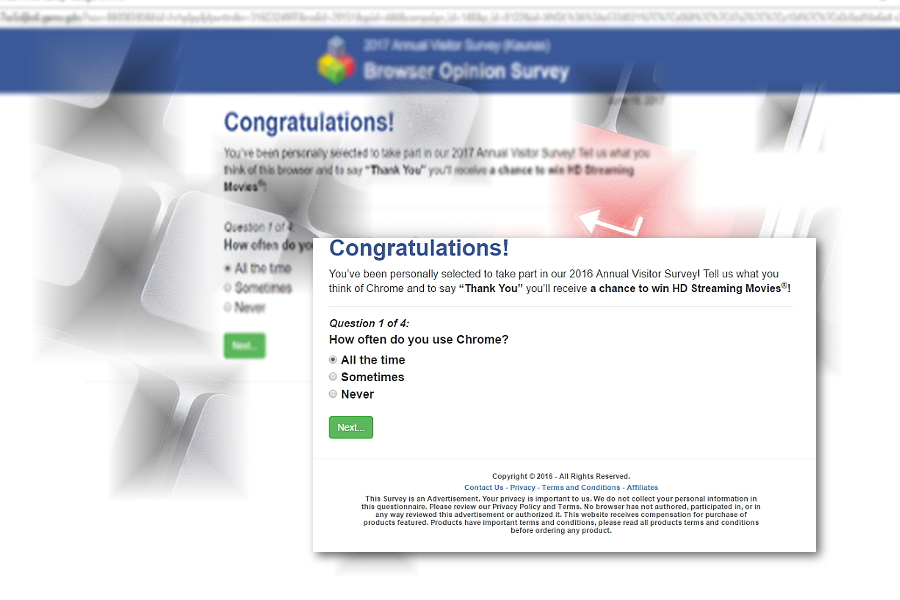
2017 Annual visitor survey: fake or genuine?
Despite how often you browse the Web or what websites you visit, it would not be a mistake to say that at least once you were redirected to a web page which displayed Browser opinion survey message. Such occurrence takes place in all major browsers: Chrome, Internet Explorer, Firefox and in MS Edge.
Behind the veneer
Perhaps a decade ago, such message might have indeed seemed genuine. However, due to its activity on the cyber space, it attracted not only users’ attention but IT experts’ attention as well.
At first glance, this lottery seems quite useful, you just have to answer few short questions and reclaim your prize. Regarding the trend, the developers of the “annual online survey” offer HD streaming services, Amazon gift cards, Samsung galaxy, the latest iPhone model, and different iPads.
Just an ordinary online lottery?
However, these seemingly useful questionaries are more than just surveys. Even if you are aware of cyber threats and places where they are most likely to occur, there is still a high chance that you may bump into 2017 Annual visitor survey.
This message may occur unexpectedly in a new tab while you attempted to play a movie online or clicked on the article with an intriguing headline.
After investigating the roots of these pop-up surveys, IT experts have unraveled that it is related to the notorious advertising platform – AdNetworkPerformance. Besides Annual visitor survey notifications, the platform triggers a variety of ads which either promote highly questionable app updates.
Recently, these notifications have become again the topic of discussion in the media. Not only did the increase in number, but filling up such survey may have more troublesome outcomes than you think.
Usually, if you fill up the survey, you will be asked to enter your email address or the phone number. Consequently, spam messages will surely find their way into your Inbox. It is common for such ads to be personalized.
Naturally, if you receive a message addressing you personally and offering to review the attachment, you are most likely to click on it. Though there have been multiple articles warning not to open any attached documents to spam emails, note that if you give into curiosity, you might get to know the severe outcomes of ransomware or other malware.
Furthermore, cyber security specialists have determined that 2017 Annual visitor survey might direct to websites promoting persistent and even fraudulent browser infections. Some users have reported that the aware “hijacks” their browser as they cannot exit the page or even access the Settings.
Advice for the future
As cliché as it may sound, let us remind that nothing is for free. The same principle may soon become a norm on the cyber space as well. On another hand, 2017 Browser online survey will not grant you any device or gadget for free, but instead, may deliver a much more bothersome “gift.” Retain rational thinking and think twice before you disclose any personal information in the cyber space.
